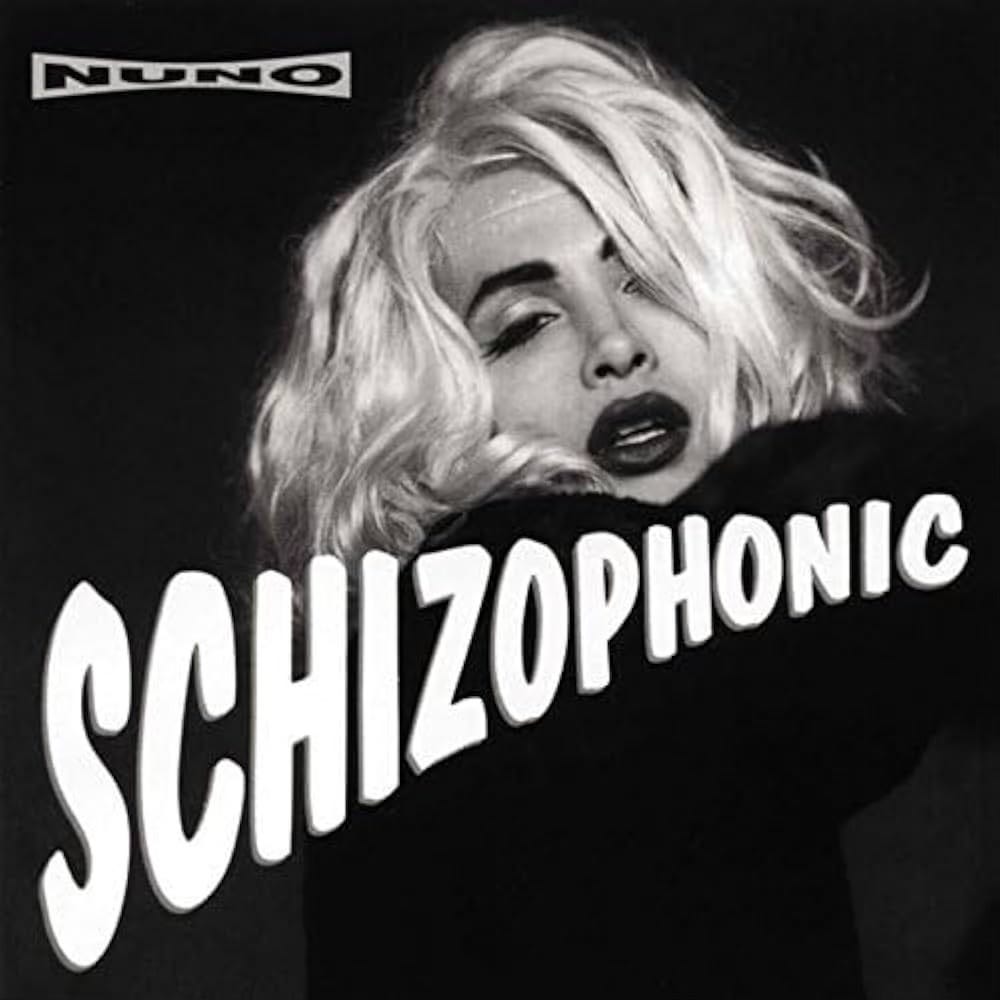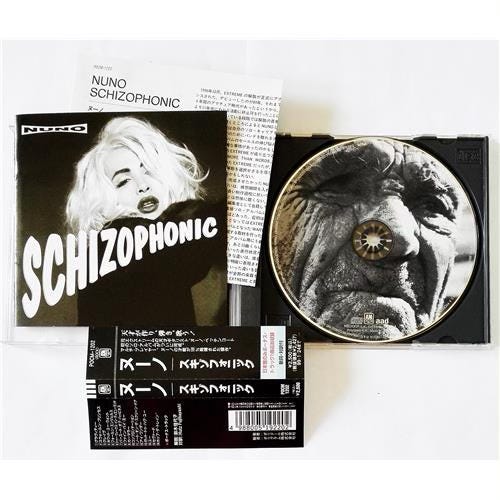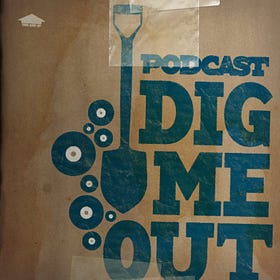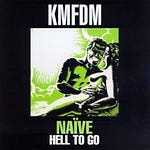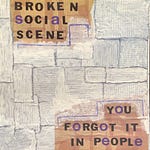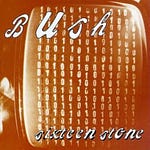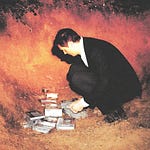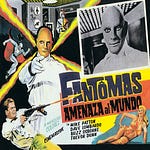You remember 1997, right? That weird stretch when nothing quite made sense anymore—grunge was flatling, Britpop had peaked, and something heavier was lurking just offstage. Nirvana was gone. The Smashing Pumpkins were getting weird. MTV was losing interest in alt rock.
Into this sonic vacuum, A&M Records dropped something nobody was expecting: a solo album credited simply to “Nuno.”
No last name. No band affiliation. Just one word and a title that sounded like a Pixies outtake: Schizophonic.
Most people had no idea who this was. Sure, hard rock enthusiasts knew Nuno Bettencourt—the shred wizard from Extreme, that funk-metal band with the acoustic hit “More Than Words.” But Extreme had dissolved the year before. Why would anyone care about his solo project in 1997?
That’s exactly what made Schizophonic so strange and so brilliant. It arrived with zero hype, zero cultural moment, and zero expectations. A 76-minute statement of purpose from an artist nobody asked to solo. What Bettencourt delivered wasn’t a cash grab, and it definitely wasn’t another guitar hero ego trip. It was something far more dangerous: a completely honest map of where rock music was already heading, years before anyone else bothered to look.
The Extreme Departure That Made Perfect Sense
By 1997, Extreme had been done for a year. Gary Cherone had temporarily fled to Van Halen. The funkiest hard rock band of the early 90s was officially kaput. But instead of mourning what was lost, Nuno saw opportunity. Working with producers Anthony J. Resta—fresh off Duran Duran’s massive comeback album—and Bob St. John, he crafted something that belonged to no particular scene.
Schizophonic found Bettencourt playing nearly everything: guitars, bass, drums, vocals. The only outsiders were Dream Theater’s Mike Mangini on two tracks and Gary Cherone lending vocals to one song.
When Influence Becomes Innovation
Critics and fans immediately heard Stone Temple Pilots, Foo Fighters, even Weezer echoes throughout the record. But dismissing Schizophonic as derivative misses the point entirely. Bettencourt wasn’t copying—he was synthesizing. His Portuguese DNA and funk influences merged with 90s alternative textures to create something genuinely new.
Take “Carmela”—a track built around a phased guitar effect so distinctive it sounds like nothing before or since. Or “Swollen Princess,” which could’ve been a Silver Sun deep cut if not for Bettencourt’s unmistakable precision and melodic sophistication. This wasn’t a guitar player trying to write songs; this was a songwriter who happened to be a guitar virtuoso.
The Production Revolution Hidden in Plain Sight
While grunge bands were still recording in basements, Bettencourt was quietly pioneering techniques that wouldn’t become standard until the early 2000s. Working with Anthony J. Resta—a producer known for his “Eno-esque soundscapes” and vintage equipment mastery—Schizophonic featured layered textures and digital experimentation years ahead of its time.
The album’s vintage-warm production created cohesion across seemingly disparate musical styles. Where other artists’ eclectic attempts fell apart under scrutiny, Schizophonic held together through sheer sonic personality. Every track sounded unmistakably like the same artist, despite covering territory from power pop to proto-post-grunge.
The Precision Behind the Chaos
What sets Bettencourt apart from his shredder contemporaries isn’t just technical ability—it’s restraint. Unlike the Vai/Satriani school of guitar athletics, every solo on Schizophonic serves the song. His sweeping technique and rhythmic precision are immediately identifiable, but they never overshadow the melody.
“He doesn’t just play notes—he plays music,” as one fan put it. That distinction explains why tracks like “What You Want” and “Two Weeks in Dizkneeland” work as complete compositions rather than showcases for finger exercises.
The Funk Foundation
Bettencourt’s secret weapon has always been his rhythmic DNA. Growing up as the youngest of ten kids, he absorbed everything from James Brown to Tower of Power, plus the percussive nature of Portuguese folk music. That rhythmic sophistication appears throughout Schizophonic, turning potentially generic 90s rock into something with genuine groove.
“I think being Portuguese, there was always a rhythmic thing in my DNA,” Bettencourt explained. “I was always attracted to the funkier side of what rock bands did”. That pocket—that ability to make heavy music swing—is what elevates Schizophonic above its contemporaries.
The Timing That Couldn’t Have Been Worse (Or Better)
Released in February 1997, Schizophonic arrived at rock’s most confusing moment. Grunge was dying, nu-metal was brewing, and pop-punk was still underground. Nothing about the musical climate suggested audiences were ready for a sophisticated power-pop record from Extreme’s guitarist.
The album peaked at a modest number 174 on the Billboard 200—respectable for a solo debut, but hardly earth-shaking. Critics were divided. Some praised its ambition and songcraft. Others found it scattered or derivative. Almost everyone missed its prescient qualities.
The Legacy That’s Still Unfolding
Looking back now, Schizophonic feels like a lost classic—the bridge between 90s alternative’s peak and the more polished, eclectic rock that would define the early 2000s. Its influence appears in subtle ways: the way modern guitarists approach tone, the acceptance of stylistic diversity within single albums, the understanding that virtuosity works best when it serves songs rather than dominating them.
Bettencourt himself has remained maddeningly elusive about the album’s significance. Recent interviews find him more excited about working with Rihanna or reuniting Extreme than dwelling on solo material. That humility—that refusal to oversell his achievements—is probably why Schizophonic remains so overlooked.
Why It Still Matters
In an era when every guitarist feels compelled to showcase their influences across social media, Schizophonic offers a different model: synthesize rather than imitate, innovate within tradition, prioritize songs over skills. It’s a master class in creative restraint from someone who could easily indulge in excess.
Twenty-seven years later, as rock music continues fracturing into microgenres and solo artists struggle to maintain coherent identities, Schizophonic feels remarkably contemporary. It’s the sound of an artist confident enough to follow his instincts, skilled enough to execute his vision, and wise enough to know when to hold back.
Maybe that’s the real genius of Schizophonic—not its technical prowess or eclectic range, but its proof that the best music comes from artists brave enough to trust their own voices, even when the world isn’t quite ready to listen.
Songs in this Episode
Intro - Gravity
14:23 - What You Want
19:28 - Karmalaa
25:43 - Swollen Princess
36:31 - Fine By Me
47:28 - Fallen Angels
Outro - Severed
#518: Waiting For The Punchline by Extreme
As we've discussed previously with episodes on Mötley Crüe and Skid Row, the 1990s were a weird evolutionary period for '80s hard rock and metal bands tagged with monikers "glam" or "hair" to describe their look even if it didn't describe their sound. So much so, there's always a caveat to their '90s releases as to whether the band tried to update their…
#179: Silver Sun by Silver Sun
Our requested review for this week takes us back to the UK to check out the 1997 self-titled debut album from Silver Sun. Hooks, harmonies and loud guitars sum up Silver Sun's freshman release, and it's chock full of them. Song after song is a sugar sweet power pop attack, with nods to Cheap Trick, Jellyfish, The Beatles, Beach Boys and more. But is it …
#188: Twice Removed by Sloan
With a new album out soon and twenty years since their sophomore release Twice Removed, we thought now was a good time to head north of the border and investigate Sloan. We dive into the four-singer/songwriter band, try to figure out if this is the best Canadian album of all time





